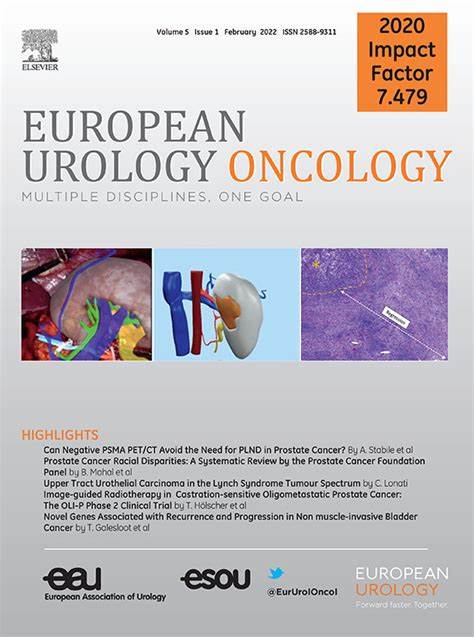Prognostic and Predictive Role of SPOP Mutations in Prostate Cancer: A Systematic Review and Meta-analysis
IF 8.3
1区 医学
Q1 ONCOLOGY
引用次数: 0
Abstract
Context
Mutations in the speckle-type POZ (SPOP) gene are frequently identified in prostate cancer (PC); yet, prognostic implications for affected patients remain unclear. Limited consensus exists regarding tailored treatments for SPOP-mutant (SPOPmut) PC.
Objective
To elucidate the prognostic and predictive significance of SPOP mutations across distinct PC stages and treatments.
Evidence acquisition
A systematic literature search of PubMed, Embase, and Scopus was conducted up to January 29, 2024. The meta-analysis included studies comparing survival outcomes between SPOPmut and SPOP wild-type (SPOPwt) PC.
Evidence synthesis
From 669 records, 26 studies (including five abstracts) were analyzed. A meta-analysis of metastasis-free survival in localized (hazard ratio [HR]: 0.72, 95% confidence interval [CI]: 0.59–0.88; p < 0.01) and overall survival (OS) in metastatic PC (HR: 0.64, 95% CI: 0.53–0.76; p < 0.01) showed a favorable prognosis for patients with SPOPmut PC. In metastatic settings, SPOP mutations correlated with improved progression-free survival (PFS) and OS in patients undergoing androgen deprivation therapy ± androgen receptor signaling inhibitor (HR: 0.51, 95% CI: 0.35–0.76, p < 0.01, and HR: 0.60, 95% CI:0.46–0.79, p < 0.01, respectively). In metastatic castration-resistant PC, only abiraterone provided improved PFS and OS to patients with SPOP mutations compared with patients with SPOPwt, but data were limited. SPOP mutations did not correlate with improved PFS (p = 0.80) or OS (p = 0.27) for docetaxel.
Conclusions
Patients with SPOPmut PC seem to exhibit superior oncological outcomes compared with patients with SPOPwt. Tailored risk stratification and treatment approaches should be explored in such patients.
Patient summary
Speckle-type POZ (SPOP) mutations could be a favorable prognostic factor in patients with prostate cancer (PC) and may also predict better progression-free and overall survival than treatment with hormonal agents. Therefore, less intensified treatments omitting chemotherapy for patients with SPOP-mutant PC should be explored in clinical trials.
前列腺癌 SPOP 基因突变的预后和预测作用:系统回顾与元分析》。
背景:前列腺癌(PC)中经常会发现斑点型POZ(SPOP)基因突变,但对受影响患者的预后影响仍不明确。关于SPOP突变(SPOPmut)PC的定制治疗,目前达成的共识有限:目的:阐明SPOP突变在不同PC分期和治疗中的预后和预测意义:对截至 2024 年 1 月 29 日的 PubMed、Embase 和 Scopus 文献进行了系统检索。荟萃分析包括比较SPOP突变型和SPOP野生型(SPOPwt)PC生存结果的研究:对 669 条记录中的 26 项研究(包括 5 篇摘要)进行了分析。对局部无转移生存率(危险比 [HR]:0.72,95% 置信区间)进行了荟萃分析:0.72,95% 置信区间 [CI]:0.59-0.88; p 结论:与 SPOPwt 患者相比,SPOPmut PC 患者的肿瘤治疗效果似乎更好。患者总结:斑点型POZ(SPOP)突变可能是前列腺癌(PC)患者的有利预后因素,也可能预示着比激素药物治疗更好的无进展生存期和总生存期。因此,应在临床试验中探索对SPOP突变PC患者采取省略化疗的低强度治疗方法。
本文章由计算机程序翻译,如有差异,请以英文原文为准。
求助全文
约1分钟内获得全文
求助全文
来源期刊

European urology oncology
Multiple-
CiteScore
15.50
自引率
2.40%
发文量
128
审稿时长
20 days
期刊介绍:
Journal Name: European Urology Oncology
Affiliation: Official Journal of the European Association of Urology
Focus:
First official publication of the EAU fully devoted to the study of genitourinary malignancies
Aims to deliver high-quality research
Content:
Includes original articles, opinion piece editorials, and invited reviews
Covers clinical, basic, and translational research
Publication Frequency: Six times a year in electronic format
 求助内容:
求助内容: 应助结果提醒方式:
应助结果提醒方式:


